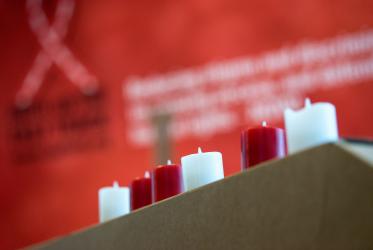By Albin Hillert
“In our community, HIV is not spoken about openly. And the challenge is, it’s like people are both informed and not informed. They know what HIV is, that it’s an illness that can be treated, but still they don’t want to really talk about it, like they don’t really want to know about it…”
It is late October, and we are joining a youth fellowship meeting at the Saint Pathenios Orthodox Church in Nairobi, Kenya. The fellowship gathers every Sunday after service, for times of song, dance, prayer, and a safe space to share views on life and the issues they face.
In recent years, church leaders at Saint Pathenios have received regular training by staff from the World Council of Churches Ecumenical HIV and AIDS Initiatives and Advocacy in contextual Bible study, a concept they now use to address issues of sexual violence, gender justice and, in particular, HIV from a faith perspective.
“What we basically do in contextual Bible study, is to study specific Bible verses to see how they speak to the issues affecting us here today,” says one of the youth during our discussion. “This can help us understand that those living with HIV, for example, it’s not like they are cursed. They can still work, and live a normal life.”
Another youth fills in, “For many, the issue is still the stigma. We know we should view HIV like any other illness, like diabetes, for example, which also cannot be cured. But at the same time, if you are infected with HIV, you still hesitate to tell your friend. On Sunday, you just don’t want to be the topic of the day in church.”
Peter Kangethe, lay leader and youth pastor at Saint Pathenios, reflects, “The church in our African tradition has often treated HIV as a moral issue. But today, we actually see many youth who live healthy lives but who were born HIV positive. And so, if you deal with HIV as a moral issue today, then in many ways you miss the point.”
“Yet if you want to change something in society, you cannot ignore the church as a social driver,” says Kangethe. “In studying the Bible, we now want to find ways to address even those issues that have traditionally been difficult to discuss openly in our church.”
“If we want different perspectives, then I believe the church can be a safe space for dialogue,” reflects a third youth participant. “If you know you can stand out and still not be judged, then this can make the issues of HIV less tense, and help motivate the community to accept and speak more openly about it.”
The Saint Pathenios Orthodox Church is an autonomous congregation in the Greek Orthodox tradition. It is located in the Waithaka neighbourhood in Nairobi, Kenya. Sunday service is given in the local language Kikuyu, mixed with elements of English.
Kenya: Voice of faith communities crucial in overcoming HIV (WCC press release of 14 October 2016)
Ecumenical HIV and AIDS Initiatives and Advocacy (EHAIA)










